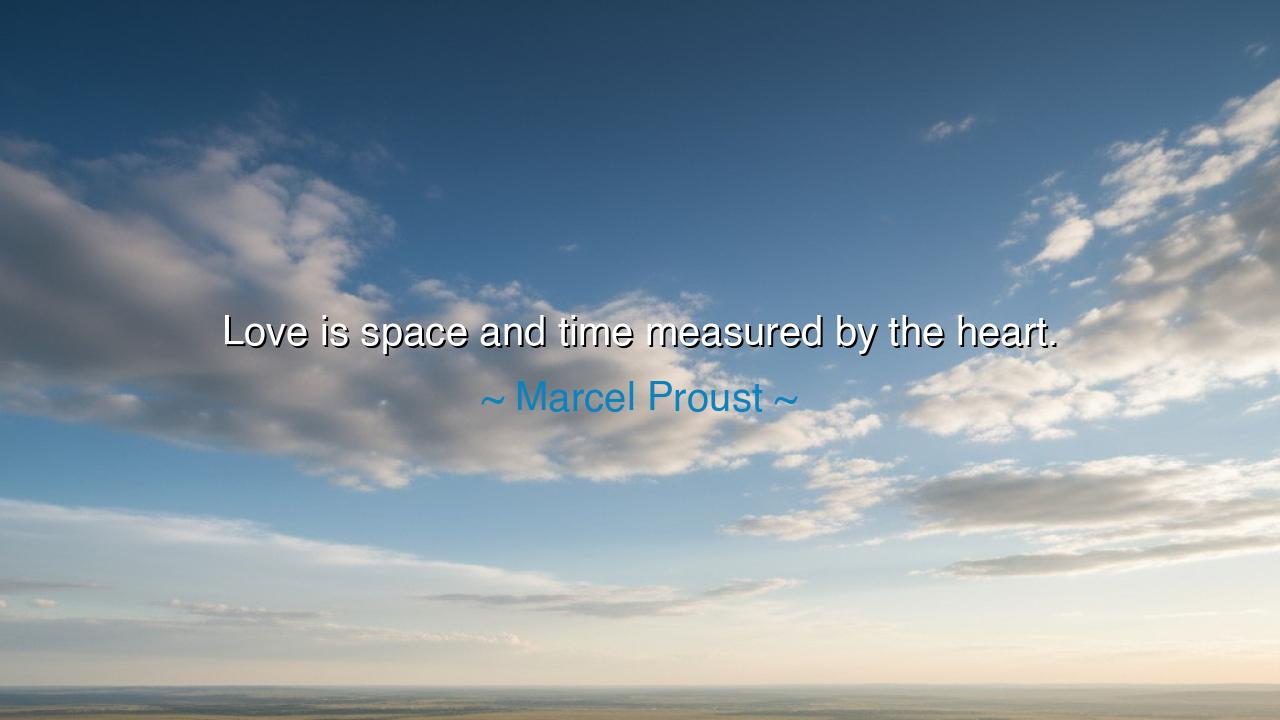
Love is space and time measured by the heart.






When Marcel Proust wrote, “Love is space and time measured by the heart,” he captured one of the most profound truths ever spoken about the nature of love. In those few words, the French novelist revealed that love is not governed by the clocks or maps of the physical world, but by the inner rhythm of the soul. To the intellect, love is bound by distance and duration; but to the heart, it exists in a dimension all its own — where moments can feel eternal, and years can pass like the blink of an eye. For Proust, who devoted his life to exploring memory and emotion, love was the sacred measure by which life itself gains meaning.
The origin of this quote lies in Proust’s monumental work, In Search of Lost Time (À la recherche du temps perdu), a novel that sought to capture the essence of experience — how time, memory, and emotion intertwine. Proust saw that love transforms both time and space: it stretches and compresses them according to the pulse of longing, the ache of absence, the ecstasy of presence. When one is in love, distance disappears; when one loses love, even a single day can feel like eternity. Thus, he declared that love is not measured by the world’s instruments, but by the heart’s perception, which transcends all laws of physics.
To love, then, is to enter a different kind of time — sacred time. Think of two lovers who spend an evening together and later remember it as though it lasted a lifetime. Or the parent who holds a newborn and feels that one heartbeat could contain all of existence. In those moments, time no longer flows; it deepens. Love has the power to suspend the ordinary world, to create a private universe between souls. This is what Proust meant: that love makes the heart the true measure of reality. What matters is not how long or how far, but how deeply one has felt.
This truth is echoed in the stories of the ages. Consider the legend of Shah Jahan, who built the Taj Mahal in memory of his beloved wife, Mumtaz Mahal. Years passed after her death, empires rose and fell, but his love stood immortal in marble. To him, time itself bowed before devotion; distance between life and death was bridged by remembrance. In the grandeur of that monument lies Proust’s idea made visible — love transforms time into eternity and space into nearness. When the heart measures, not even death can divide.
Even in the quiet, modern world, we see this truth unfold daily. An old woman still keeps her husband’s chair empty at the table fifty years after his passing. A soldier in a faraway land clutches a letter that carries the scent of home. A mother still hears her child’s laughter long after they have grown. These are the sacred ways the heart defies time and space. Love does not count hours or miles; it counts moments of meaning. It holds close what the body cannot, and in doing so, it creates its own dimension — the eternal dimension of the soul.
Proust’s words also carry a message about memory. For him, love does not end; it changes form and lives within remembrance. A person may be gone, a season may pass, but the heart still measures their presence in invisible ways — through scent, sound, or the sudden ache of nostalgia. Memory becomes the vessel of love, and love becomes the architect of memory. In this way, love defies both the past and the future, existing always in the eternal now.
So, my child, take this lesson to heart: do not measure love by the length of time it lasts or the nearness of the one you love. Measure it by how deeply you feel, by how much beauty and truth it awakens within you. When you love, you step into the timeless — a realm where every gesture, every glance, every word holds infinite weight. Treasure those moments, for they are the bridges between this fleeting life and the eternal spirit.
Thus, as Marcel Proust teaches, “Love is space and time measured by the heart.” It is the heart — not the clock — that keeps true time, and the heart — not the map — that defines distance. For when one truly loves, the entire universe contracts into a single moment of presence, and a single moment expands to fill eternity. To love is to live outside of time — to dwell, even briefly, in the eternal dimension of the divine.






AAdministratorAdministrator
Welcome, honored guests. Please leave a comment, we will respond soon